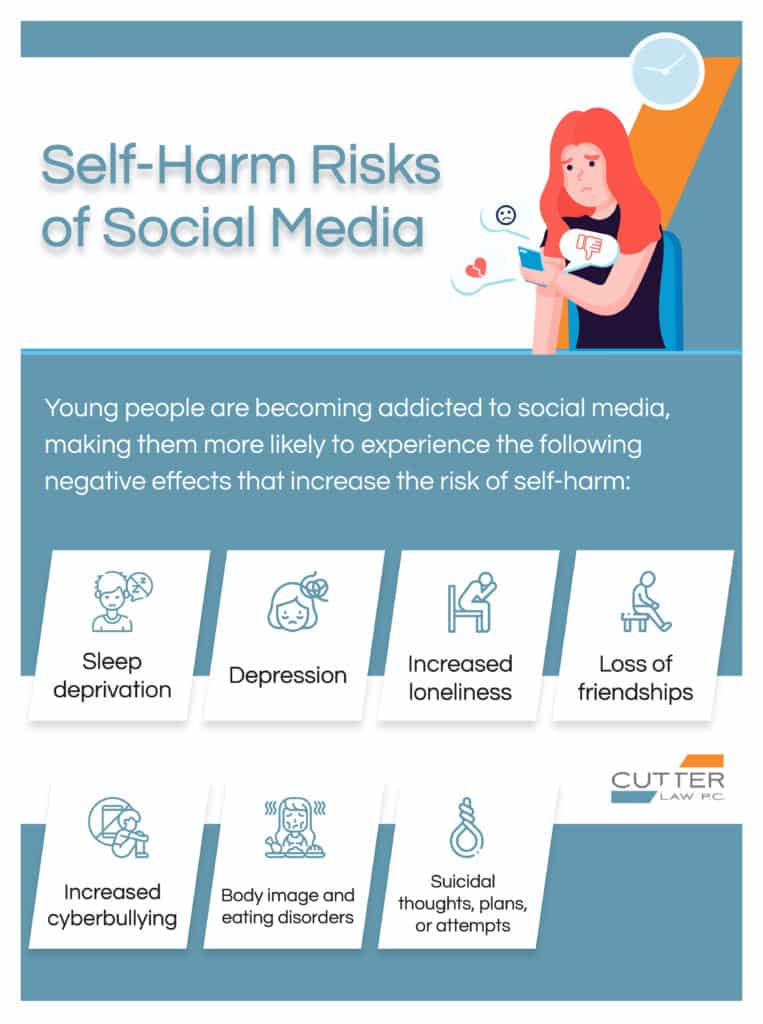Social Media and Self-Harm
Social media can cause serious, irreparable damage to your child’s well-being, mental health, and life. If your child has developed an eating disorder, attempted suicide, committed suicide, or has other mental health issues due to social media use, contact the attorneys at Cutter Law today to hold social media companies accountable.
Social media has become an essential element of many people’s daily lives. A 2023 study reported that there are 4.76 billion social media users worldwide, nearly 60 percent of the world’s population.
Social media provides ways to connect with family, friends, and colleagues, especially those far away. However, social media also has significant downsides. Children and teenagers are at risk for self-harm and suicidal thoughts due to social media use.
Learn the horrifying realities of what social media has become for children and teens and how the attorneys at Cutter Law can help you file a social media addiction lawsuit if your child has been harmed.
Quick Links
How Social Media Platforms Harm Teens
Social media is a primary means of communication for young people today, and socialization plays a large part in a teen’s developing mind. Around age 10, children begin seeking social rewards, including attention and peer approval. When someone compliments your child’s joke or clothes, this releases hormones like dopamine that make them happy and satisfied.
In generations past, young people socialized in person at the mall, the movies, or the park. But today, much of your child’s socialization happens online via Facebook, Instagram, Snapchat, or other social media sites.
Social media companies capitalize on this need for social rewards. Instead of an in-person compliment, a child receives a dopamine hit when they receive a like on their social media post or reach a certain number of followers.
Teens are also very impressionable, and social media is a never-ending source of information. They get bombarded with advertisements and posts that finely tuned algorithms determine they will like. Tracking your child’s clicks and views also helps these companies show young users more of what will keep them scrolling.
For example, liking one photo of a model results in the appearance of many others in their feed. Soon your child’s feed will be full of touched-up photos of seemingly perfect-looking people. When a teen looks at photos of beautiful, idealized bodies, it is all too easy to become self-conscious about how they look.
On top of this, not all social media interactions are positive. Cyberbullying is rampant. Harmful comments such as racist or homophobic remarks, incitement to violence, and fat shaming are all examples of the negative side of social media.
This negativity can lead to young ones developing mental health issues such as eating disorders, depression, anxiety, and even thinking about or attempting suicide.

Self-Harm Risks of Social Media

Too often, social media also normalizes self-harm, facilitates sharing techniques, and encourages concealment. Young people who turn to the internet for understanding and support get drawn into self-harm communities that encourage the behavior.
Meanwhile, young people are becoming addicted to social media, making them more likely to experience the following negative effects that increase the risk of self-harm:
- Sleep deprivation
- Depression
- Increased loneliness
- Loss of friendships
- Increased cyberbullying
- Body image and eating disorders
- Suicidal thoughts, plans, or attempts
The Beginning: The Meta Whistleblower
Recently, former product manager Frances Haugen came forward as a whistleblower against Meta, the parent company of Facebook and Instagram. Haugen quit her job at Facebook in May 2021, but not before taking some very important research with her.
She accuses Facebook of choosing its own interests and profits over its users’ well-being. One study showed that Facebook stops only a small percentage of hate, violence, and incitement content. An internal study done by Facebook found that 13.5 percent of teenage girls said Instagram made their suicidal thoughts worse, and 17 percent of teenage girls said Instagram made their eating disorders worse.
What Are Social Media Harm Lawsuits?
Following Haugen’s testimony, lawsuits were filed nationwide against social media companies over the platforms’ harmful effects. The suits’ legal claims are based on allegations that social media companies purposely encourage social media addiction with their algorithms, exposing young people to the risk of self-harm.
Meta, Snapchat, and TikTok are all currently facing lawsuits for teenage harm.
Meanwhile, experts nationwide are weighing in on social media’s harmful effects on younger people, supporting the lawsuits’ allegations. For instance, Dr. Nancy DeAngelis, the director of behavioral health at Jefferson Health in Abington, Pennsylvania, has said that social media companies use their algorithms to keep users hooked by activating the brain’s reward center, which creates a euphoric high similar to what people feel when they gamble or use drugs.
Potential Damages for Social Media Harm Lawsuits
Each lawsuit is different, so damages are challenging to estimate. In general, you may be able to claim three types of damages—economic damages, non-economic damages, and punitive damages.
- Economic damages are quantifiable. They include medical bills, such as psychiatrist and other doctor visits, therapy, and hospital visits. You may also receive reimbursement for loss of income if you had to take time off work to care for your child.
- Non-economic damages, on the other hand, are non-quantifiable. They include the pain and suffering and loss of enjoyment of life your child suffered.
- Punitive damages are designed not to compensate the victim but to punish the defendants—social media companies. The purpose is to punish social media companies for profiting from harm to their users.
Our Social Media Harm Attorneys at Cutter Law Are Here to Fight for You
The world is not the way it was decades ago. Adults and children today are dependent on social media, and this is largely by design.
The developing brains of young people have a harder time dealing with these challenges, and social media companies have exploited this dynamic to pad their pockets. Teenagers are very susceptible to the effects of the media in general and, as a result, can develop various mental disorders, including anxiety, depression, eating disorders, suicidal thoughts, or suicide.
While pursuing a case against massive corporations like Meta, TikTok, and Snapchat may seem overwhelming, the knowledgeable, skilled, and compassionate injury attorneys at Cutter Law can help. We have over 50 years of combined experience taking on powerful interests to get justice and compensation for our clients. We will provide comprehensive representation through every step of your case to ensure the harm to your child is addressed.
While you are not required to hire a social media lawsuit attorney, there are numerous advantages to hiring qualified legal representation. To get started on your lawsuit, call Cutter Law today for your free consultation.
If social media has harmed your child, talk with one of our social media harm attorneys now. Contact our legal team at Cutter Law now for a free consultation.

FAQs
How does social media cause suicidal thoughts?
Teens are very sensitive to what others think of them. They want acceptance and validation from their peers. On social media, they can easily fall victim to cyberbullying and trolling. Because social media is now a large part of a child’s social interaction, if this happens, they can easily feel rejected by their peers.
Medical studies directly link social media use to mental health issues. Children and teens can become depressed and anxious, develop eating disorders, feel unworthy, and lose self-confidence. Eventually, this negative experience can trigger or reinforce suicidal thoughts and suicidal ideation.
If social media has caused harm to your child or teen, contact a Cutter Law social media lawyer immediately. We offer a free consultation and charge no fees unless we win.
How can a social media harm attorney help?
Beginning with a free consultation to discuss the details of your case, Cutter Law will be with you every step of the way. Our professional and compassionate legal team has extensive resources and experience to hold social media companies accountable for your child’s harm.
A California social media harm lawyer will:
- Assess your claim during a free consultation
- Inform you of your legal rights and options
- Investigate and gather evidence
- File your case
- Negotiate with social media companies for the settlement you deserve
- Prepare your case for trial if we can’t reach a settlement
- Defend your rights in court against social media companies
Who can sue for social media harm?
If you or a loved one has suffered harm because of social media, you may have a legal basis to sue the responsible social media company.
Contact our legal team at Cutter Law for a free consultation. We will provide you with an analysis of the potential for your case and the appropriate next steps. We collect no fee unless you win.
Schedule A Free Case Review
Our Office Locations
Sacramento Office
401 Watt Avenue Suite 100
Sacramento, CA 95864
Phone: 916-290-9400
Oakland Office
Cutter Law P.C.
1999 Harrison Street Suite 1400
Oakland, CA 94612


